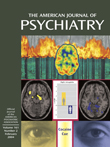Increased Brain GABA Concentrations Following Acute Administration of a Selective Serotonin Reuptake Inhibitor
Abstract
OBJECTIVE: The authors used magnetic resonance spectroscopy (MRS) to assess the effect of acute administration of the selective serotonin reuptake inhibitor (SSRI) citalopram on cortical levels of γ-aminobutyric acid (GABA). METHOD: Ten healthy volunteers received either intravenous citalopram (10 mg) or saline in a randomized, double-blind, crossover design. The occipital GABA/creatine ratio was measured with a proton MR spectral editing technique. RESULTS: In comparison with saline, citalopram produced a mean increase of 35% in relative brain GABA concentration in the occipital cortex. CONCLUSIONS: These findings extend previous work showing that SSRI treatment increases cortical GABA in depressed patients and suggest that this results from an action of SSRIs on GABA neurons rather than as a secondary consequence of mood improvement.



